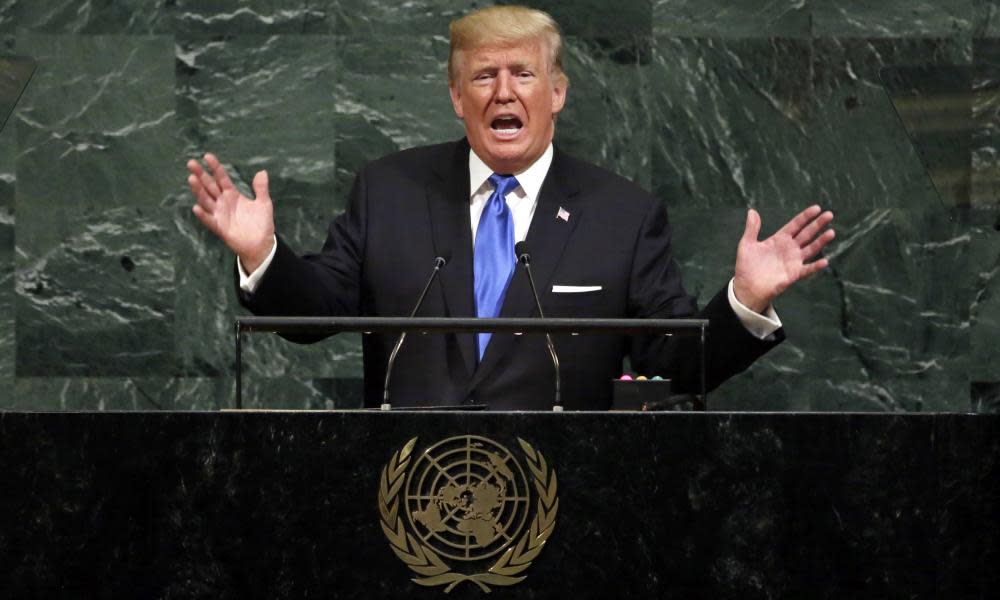Cue fireworks as ‘lord of misrule’ Donald Trump chairs UN security council

In medieval English folklore, the lord of misrule was an anarchic, half-crazed clown who presided over an annual Feast of Fools. This week the UN security council, that most august and sober of international bodies, looks set to revive the tradition with its own riotous diplomatic banquet. In the chair and wielding the gavel for the first time: none other than Donald Trump, 45th US president, former reality TV host, and modern-day lord of misrule.
Trump will be in New York for the annual UN general assembly of world leaders. Some 84 heads of state, 44 heads of government and senior ministers from the UN’s 193 sovereign states are due to attend. Like other presidents and premiers, Trump will address the assembly on Tuesday. Last year he stole the show when he tore up protocol, threatened to “totally destroy” North Korea, and mocked its leader, Kim Jong-un, as “Rocket Man on a suicide mission” – before performing a dizzying U-turn this year.
Although the UN gathering will discuss a range of worthy subjects, including poverty and climate change, drug trafficking and gender equality, all eyes will inevitably be on Trump’s antics. The White House has already indicated that his main target on Tuesday will be Iran. Trump will accuse Tehran, in trademark confrontational terms, of supporting terrorism, lying about nuclear weapons, and fomenting regional instability.
But it is the unprecedented spectacle of Trump chairing a security council session, scheduled for the following day, that could attract most attention. Since he apparently believes he is the No 1 world leader, here is his chance to prove it.
Iran will again top the agenda – because the country whose turn it is to chair the council, in this case the US, chooses what it debates. Trump is expected to try to browbeat members into backing swingeing new US sanctions on Tehran.
And that’s when the trouble could start. All the other permanent members of the council – China, Russia, the UK and France – have deplored Trump’s decision to withdraw from the UN-endorsed, multilateral nuclear pact with Iran. The EU and others are working to minimise the impact of sanctions. They all believe it is better to engage with Iran rather than ostracise it, and despite denials, they all suspect Trump’s ultimate aim is regime change. US officials, fearing a major embarrassment, have already broadened the council’s agenda to encompass nuclear proliferation in general. But if Trump resorts to the disrespectful language, blatant untruths and bullying that have come to characterise his presidency, he may provoke a powerful backlash.
Far from supporting his claim to global leadership, the ensuing row could starkly dramatise American isolation. And that would hand a victory to Iran. It is even possible that Hassan Rouhani, Iran’s president, who is attending the general assembly, could come to the security council to defend his country. That is unlikely, but Rouhani is not one to duck a fight. At last year’s assembly he roundly denounced Trump as a “rogue newcomer” peddling “ignorant, absurd and hateful rhetoric”. It was America’s president, not Iran, who threatened world peace, he said.
Trump’s performance this week will raise bigger questions about his administration’s negative approach to multilateralism and international law, and his rocky relationship with the UN itself. Speaking to the American media outlet Politico last week, a senior German diplomat said preserving the Iran nuclear deal had become a “question of principle”, concerning the need to maintain international norms, treaties and agreements. Reflecting these worries, António Guterres, the UN secretary general, called on Thursday for “renewed commitment to a rules-based global order”.
Speaking against a backdrop of criticism of the UN’s failure to halt the Syria conflict, scandals over sexual harassment and gender inequality, and funding problems, a defensive-sounding Guterres warned that “multilateralism is under attack from many different directions precisely when we need it most”. The UN, he declared, was still “the world’s indispensable forum for international cooperation”.
Trump’s willingness to exploit the UN platform for his own ends, while simultaneously denigrating and undermining it, contrasts unhappily with the historical US approach to an organisation Franklin Roosevelt was instrumental in creating in 1945. Under Trump, the US has withdrawn from the UN’s human rights council and Unesco, its education and cultural agency; cut funding for peacekeeping operations, the UN population fund and Palestinian relief agency; and boycotted the UN’s Paris climate change accord, the Iran deal, and the global migration pact.
Earlier this month, John Bolton, Trump’s national security adviser, set out plans to destroy the UN-mandated International Criminal Court, the criminal justice system’s global flagship for prosecuting genocide and war crimes. Trump, meanwhile, continues his predecessors’ practice of failing to fully pay America’s UN dues. Although the US remains the biggest contributor, its budget arrears are estimated at $1.3bn.
Trump’s contemptuous treatment of the UN sets a demoralising example for less powerful countries that value it for the voice it gives them in world affairs. It is also exacerbating a negative trend among leaders of the great powers: a tendency to bypass an often deadlocked UN over the big geopolitical questions of the day (such as Iraq and Syria). The leaders of China, Russia and India will not be in New York this week. While Trump acts out and plays the fool, they will be busy taking responsibility for global leadership off America’s hands.

 Yahoo News
Yahoo News 
